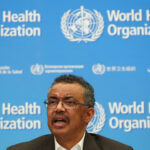Diplomatic summits among heads of states were traditionally reserved for resolving urgent political crises. However, in recent decades, they have become more frequent due to the growing needs and opportunities for collaboration. Leaders attending these summits are expected to meet as equals and address matters of mutual interest, with the choice of venue and agenda based on their relationships and objectives.
An emerging trend in post-Cold War African international relations and diplomacy is what I term ‘One-Plus-Africa’ summits. These gatherings involve major powers like the United States, China, Japan or Russia engaging individually with all African countries, setting the agenda, and choosing the venue. In this new form of summits, African countries have little or no say in deciding either the agenda or the venue.
The inaugural summit, the Sino-Africa summit, took place in November 2003, with participation from all 48 African states, mainly represented by their heads of states. Since then, major powers have increasingly favoured this approach in engaging with Africa as a whole.
As recently as December 2022, the US hosted its second US-Africa Leaders’ Summit, following the first one in 2014 led by President Barack Obama. The latest summit saw the attendance of 49 African countries, with all but four not represented by their heads of states. This growing trend underscores the significance African countries place on engaging with major powers for shared interests and cooperation, even if it means compromising on their dignity and self-respect.
Ogun: Thugs disrupted voting in 99 units, Adebutu tells tribunal
Govt urged to make basic, secondary education free, compulsory
The Russia-Africa Summit, held from 27-28 July 2023, is the latest example of the One-Plus-Africa diplomatic tradition, following a similar summit in 2019 attended by 43 African heads of states. However, due to the ongoing Ukraine war and what Putin’s press secretary Dmitry Peskov claimed to be ‘absolutely blatant, brazen interference by the US, France, and other states,’ only 16 African heads of states have confirmed their participation this year, which is far fewer than the number that attended the previous One-Plus-Africa summits. Additionally, Nigeria is among the major African countries that has also failed to confirm its attendance.
I believe that African countries not attending the Russia-Africa Summit is a commendable decision, not solely because of the obvious reason of seen not supporting Russia’s aggression against Ukraine, but primarily due to the condescending and embarrassing nature of African leaders representing an entire continent at a summit hosted by a single country. To my knowledge, no other continent has ever been approached in such a manner. Just imagine if the US called all Asian countries to attend a summit hosted and controlled solely by the US. Similarly, there are no summits like Russia-Asia or China-Europe, America-Europe in which the great power controls everything.
Africa should not be the only continent accepting such condescending summits. African leaders need to break free from the colonial mentality and assert their equal status on the international stage. A positive step towards this is exemplified by the newly elected Kenyan President, William Ruto, who recently spoke with the Mo Ibrahim Foundation, expressing his stance that “we (some African leaders) have decided that it is not intelligent to go and sit before one gentleman from another place… and sometimes we are mistreated. We are loaded into buses like school kids.”
Admittedly, one might argue that Africa could miss out on opportunities offered by more advanced and wealthier countries, which could be instrumental for its growth and development. However, this article is not advocating for African leaders to reject the opportunities these summits offer. After all, Africa is currently in great need of Russia’s grains following the latter’s decision to withdraw from the international grain deal brokered by the United Nations and Turkey last year.
Instead of getting involved in One-Plus-Africa summits or avoiding them altogether, African countries should leverage existing platforms like the African Union or sub-regional organisations such as the Economic Community of West African States (ECOWAS), Southern African Development Community (SADC), Arab Maghreb Union, and East African Community to host countries interested in holding summits with African nations. Learning from other successful regional models like ASEAN, which has its ASEAN Plus Three and ASEAN Plus Six, can provide valuable insights.
While the essence of summits lies in meeting as equals, the One-Plus-Africa summits seem designed to grant a predetermined advantage to the host country over the entire continent. Breaking away from this pattern and asserting equal standing is essential for Africa’s dignified representation in the international arena. By prioritising diplomatic engagements through established regional frameworks, African leaders can foster cooperation and respect on the global stage.
African leaders must avoid getting entangled in the NATO-Russia conflicts or the escalating US-China competition for global dominance. These summits are increasingly becoming tools used by these actors to sway African leaders to their respective sides, resembling a new version of the Cold War. The peril of heading down this path is evident in the ongoing civil war in Sudan, where the country is divided along foreign allegiances.
In shaping the new direction of African diplomacy with major powers, it is crucial for continental leaders, including Nigeria, Egypt, South Africa, Kenya, and Ethiopia, to take the lead. If Africa wishes to earn respect from the world, it must first demonstrate self-respect and assert its own interests in its engagements with major global players. By doing so, African leaders can pave the way for a more independent and dignified representation of the continent on the international stage.
Abubakar Abubakar Usman PhD is a Research Fellow, Asia Middle Centre for Research and Dialogue (AMEC) Kuala Lumpur, Malaysia
 Join Daily Trust WhatsApp Community For Quick Access To News and Happenings Around You.
Join Daily Trust WhatsApp Community For Quick Access To News and Happenings Around You.



